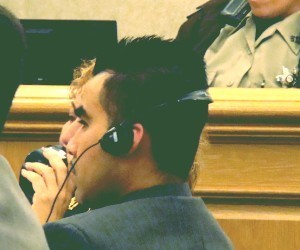Ignacio Vergara was spared the death penalty by the Hall County Superior Court jury that convicted him in August 2008.
Vergara's accomplice, Brigido Soto, turned state's evidence and testified against Vergara, telling the jury that Vergara orchestrated the killings, while admitting that he, Soto, shot the two men. Soto pleaded guilty and was given two consecutive sentences of life without parole.
Vergara's attorney argues the trial court made five errors, including illegally commenting on the evidence. Read more about the appeal below.
According to the state Supreme Court's website, the high county will hear Vergara's appeal Tuesday.
FACTS OF THE CASE, AS POSTED ON THE GEORGIA SUPREME COURT WEBSITE:
According to the evidence at trial, Ignacio Vergara . also known as "Nacho," and Brigido Soto arranged to buy two kilograms of cocaine, worth about $39,000, from Francisco Saucedo, known as "Chico Pancho."
The intent, however, according to Soto's testimony, was to steal the drugs and kill the suppliers.
On March 13, 2002, Vergara and Soto met at a Texaco gas station with Saucedo and Alejandro Santana.
Driving a white Grand Prix, Vergara and Soto led Saucedo and Santana, who drove behind them, to a desolate gravel road in another county. Two hours earlier, Vergara and Soto had visited the area to ensure it was secluded. On the way, Vergara gave Soto a gun and promised to pay him $25,000 if he murdered the drug suppliers. He also gave him gloves and told Soto to be sure to wipe the bullets clean of fingerprints. Upon arriving, Vergara got into Santana's Mitsubishi and told the suppliers that the money for the drugs was on its way. Soto also got in the car with the gun hidden in his waistband. At one point, Vergara asked to borrow Saucedo's cell phone and got out of the car, under the guise he was calling to find out where the money was. While talking on the phone, he signaled Soto to shoot.
Soto, who by now was standing at the passenger side, fired up to eight rounds.
Following the murders, Vergara and Soto searched for the drugs, which they found in the floorboard on the driver's side. They then left the scene, disposing of the phone, gloves and gun.
The State announced it would seek the death penalty against Vergara and Soto.
Soto wound up pleading guilty in exchange for avoiding the death sentence.
Following an August 2008 trial, the jury found Vergara guilty of malice murder, felony murder, armed robbery and other crimes. The jury rejected the death sentence, and Vergara got life without parole. After the court denied Vergara's motion for a new trial, he appealed to the state Supreme Court.
ARGUMENTS: His attorney argues the trial court made five errors, including illegally commenting on the evidence when it instructed the jury that armed robbery could be committed if the killing occurred first and the taking of property occurred second. It is "plain error" for a judge to express his opinion as to what has or hasn't been proved, the attorney argues, and his conviction for armed robbery and the related felony murder charge must be reversed as a result. They must also be reversed, Vergara's attorney contends, because an essential element of robbery is the relinquishment of possession of the property through force or intimidation. Here, Vergara asked to borrow Saucedo's cell phone. He did not take it with force.
The attorney contends three of the errors involved "ineffective assistance of counsel" by the trial attorney, including the attorney's failure to request a jury instruction on "accessory after the fact." An accessory after the fact is not a party to the crime, but is guilty of obstruction of justice.
The State argues the trial court made no errors, and the judge did not improperly comment on the evidence in instructing the jury. Rather, the judge merely stated a legal principal that the jury should consider, the State's attorneys argue. Also, the State adequately proved an armed robbery and corresponding felony murder occurred as the victim's cell phone was taken by use of a deadly weapon. The victim would have expected to get his phone back, but that did not happen because he was instead shot and killed at Vergara's instruction, the State argues. The theft could not have been completed but for the use of force. The trial attorney also was not ineffective, the State contends. Because Vergara was charged as a party to the crime, not just as an accessory after the fact, it would have been error to give the charge of accessory.
Attorney for Appellant (Vergara): Brian Steel
Attorneys for Appellee (State): Lee Darragh, District Attorney; Alison Toller, Asst. D.A.

Ignacio Vergara at his trial in Gainesville in August 2008.
http://accesswdun.com/article/2010/3/227582
